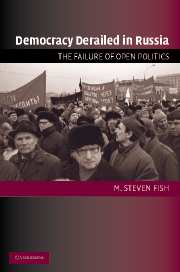Book contents
- Frontmatter
- Contents
- List of Figures and Tables
- Acknowledgments
- Abbreviations
- 1 INTRODUCTION
- 2 SOME CONCEPTS AND THEIR APPLICATION TO RUSSIA
- 3 SYMPTOMS OF THE FAILURE OF DEMOCRACY
- 4 THE RUSSIAN CONDITION IN GLOBAL PERSPECTIVE
- 5 THE STRUCTURAL PROBLEM: GREASE AND GLITTER
- 6 THE POLICY PROBLEM: ECONOMIC STATISM
- 7 THE INSTITUTIONAL PROBLEM: SUPERPRESIDENTIALISM
- 8 CAN DEMOCRACY GET BACK ON TRACK?
- References
- Index
- Titles in the series
5 - THE STRUCTURAL PROBLEM: GREASE AND GLITTER
Published online by Cambridge University Press: 05 September 2012
- Frontmatter
- Contents
- List of Figures and Tables
- Acknowledgments
- Abbreviations
- 1 INTRODUCTION
- 2 SOME CONCEPTS AND THEIR APPLICATION TO RUSSIA
- 3 SYMPTOMS OF THE FAILURE OF DEMOCRACY
- 4 THE RUSSIAN CONDITION IN GLOBAL PERSPECTIVE
- 5 THE STRUCTURAL PROBLEM: GREASE AND GLITTER
- 6 THE POLICY PROBLEM: ECONOMIC STATISM
- 7 THE INSTITUTIONAL PROBLEM: SUPERPRESIDENTIALISM
- 8 CAN DEMOCRACY GET BACK ON TRACK?
- References
- Index
- Titles in the series
Summary
We live so badly, though we are in the richest country in the world.
– A lament very commonly heard in RussiaAnyone who has never heard the dirge in this epigram has not spent much time in Russia. It rings out in dinner conversations, classrooms, and political campaigns. The reference to riches is an allusion to Russia's matchless endowment of oil, gas, metals, and precious stones. In the minds of most, the superabundance of grease and glitter found in the ground only adds to the shame of the persistent gap in living standards and freedom between Russia and the advanced industrialized West. Few regard their country's extraordinary fossil and mineral endowment as a problem. Most consider it a solution – even if an ever-elusive one – to the country's problems. Rulers must really mismanage the state in order for things to be unidyllic as they are. If Russia were a “poor” country, perhaps the hardships would be understandable. But how can the inhabitants of such an exorbitantly rich land continue to lack control over their own fates and fortunes?
Such sentiment is hardly surprising. Rich natural endowment appeals to people everywhere. Some may be aware of the hazards of superabundance. But has striking oil ever been met with a groan? Natural riches often appear to provide enormous advantages. Under some conditions and in some places perhaps they actually do. But natural superabundance is usually one of democracy's worst antagonists.
- Type
- Chapter
- Information
- Democracy Derailed in RussiaThe Failure of Open Politics, pp. 114 - 138Publisher: Cambridge University PressPrint publication year: 2005
- 1
- Cited by

